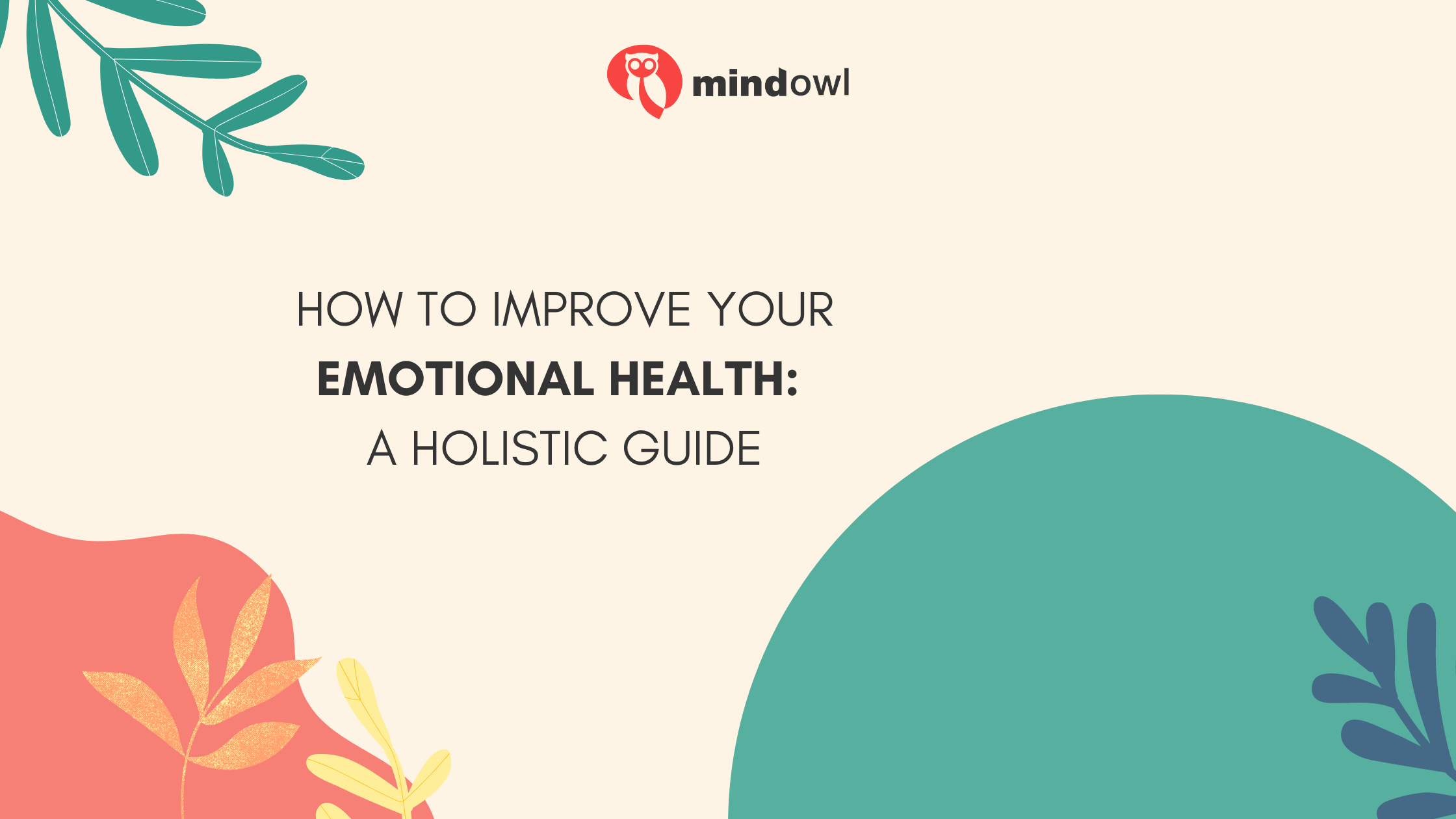
Do you find yourself feeling overwhelmed, stressed, or anxious? These emotions are normal parts of life, but when they become persistent or interfere with daily activities, it’s time to prioritize your emotional health.
However, cultivating overall emotional health requires more than understanding your emotions. It involves developing healthy coping mechanisms, building resilience, and nurturing positive relationships. That said, this article will explore practical strategies and techniques for improving emotional health.
1. Mindful Use of Technology
Technology, while beneficial in many ways, can negatively impact emotional health when overused. Social media often contributes to feelings of envy, inadequacy, or anxiety by exposing you to unrealistic portrayals of other people’s lives. To protect your emotional health, set limits on your screen time, particularly when it comes to social media.
Be intentional with your use of technology, focusing on interactions and content that enrich your life rather than drain it. Periodically engaging in a digital detox can also provide a much-needed mental break. Taking time away from screens allows you to reconnect with yourself and the physical world around you, which is essential for maintaining emotional balance.
2. Balanced Nutrition and Exercise
Physical health and emotional well-being are deeply interconnected. A balanced diet rich in whole foods like fruits, vegetables, lean proteins, and healthy fats not only fuels the body but also supports brain function and emotional stability. Nutritional deficiencies can contribute to mood swings, irritability, and even mental health conditions like anxiety or depression. Physical activity is essential, as regular exercise releases endorphins—the body’s natural mood enhancers—that help alleviate stress, improve sleep and boost your overall sense of well-being.
In addition to a balanced diet and regular exercise, hydration and adequate sleep are critical. Dehydration can lead to fatigue and low energy, while sleep deprivation impairs cognitive function and emotional regulation, making you more susceptible to negative emotions. Aim for 7-9 hours of quality sleep each night to keep your emotional health in balance.
3. Mindful Self-Awareness
Mindful self-awareness is the cornerstone of emotional health, and it begins with being fully present in the moment. Practicing mindfulness can significantly reduce stress by helping you observe your thoughts and emotions without judgment. Techniques such as meditation, deep breathing exercises, or yoga can enhance your ability to focus on the present, leaving behind past regrets and future anxieties.
Journaling is another powerful tool for cultivating self-awareness. By writing down your thoughts and feelings, you gain clarity on emotional patterns and triggers, allowing you to process emotions more effectively. Monitoring your internal dialogue is equally important. The way you speak to yourself shapes your emotional state, and shifting from negative self-talk to positive affirmations can profoundly uplift your mood, build self-esteem, and enhance emotional resilience.
4. Nurture Relationships
Emotional health is often nurtured through meaningful human connections. Positive relationships with family, friends, and colleagues provide emotional support, reduce feelings of loneliness, and give you a sense of belonging. However, quality matters more than quantity—it’s important to foster relationships that uplift and empower you. Spending time with loved ones, whether through shared activities or deep conversations, strengthens these bonds and creates a support system that can help you navigate emotional challenges.
Equally crucial is setting healthy boundaries. Maintaining emotional health sometimes requires distancing yourself from toxic individuals or situations that drain your energy. Expressing gratitude in your relationships is another way to improve emotional health. When you regularly appreciate others, you create positive emotional exchanges that deepen your connections and boost your sense of well-being.
5. Manage Stress Effectively
Stress is an inevitable part of life, but how you manage it greatly impacts your emotional health. Start by identifying your specific stress triggers, whether they come from work, relationships, or personal expectations. Once identified, create practical strategies to manage or mitigate these stressors, such as breaking tasks into manageable steps or practicing deep breathing in tense situations.
Developing a relaxing routine is crucial to emotional health. To regularly release built-up tension, engage in activities that relax you, like reading, listening to music, or spending time in nature. Time management is another powerful tool. By prioritizing tasks, delegating when necessary, and setting realistic goals, you can prevent feelings of being overwhelmed, which are often the root cause of chronic stress and emotional burnout.
6. Emotional Expression and Processing
Expressing and processing emotions is vital to maintaining emotional health. Keeping emotions bottled up can lead to emotional exhaustion, anxiety, or depression. It is important to communicate your feelings with trusted individuals, whether that’s through conversations with close friends or family members or professional therapy. Open communication allows you to release pent-up emotions and gain new perspectives on your challenges.
In addition to verbal expression, creative outlets like art, music, or writing can help you process emotions in a non-verbal way. Creativity allows for a safe space to express complex feelings that might be difficult to articulate, giving you emotional release and clarity. Seeking therapeutic outlets, such as individual therapy or support groups, offers a structured environment to work through difficult emotions and develop emotional intelligence.
7. Spiritual and Mental Well-Being
Spiritual and mental well-being are essential components of emotional health. For many, practices like meditation, mindfulness, or prayer offer a sense of peace, grounding, and connection to something greater than themselves. These practices calm the mind and enhance emotional awareness, helping you navigate daily stresses with greater ease. Finding purpose in life is another significant aspect of emotional well-being.
When you engage in activities that align with your values, whether that’s through work, hobbies, or community involvement, you cultivate a sense of meaning that sustains you emotionally. Spiritual practices, whether religious or secular, can provide comfort and inner peace, helping you cope with emotional challenges by offering perspective and hope. These practices can also connect you to a community of like-minded individuals who share similar beliefs, providing both emotional support and companionship.

8. Develop Resilience
Resilience is the ability to bounce back from life’s inevitable setbacks and is a crucial factor in maintaining emotional health. One of the most critical aspects of resilience is learning to accept change. Life is unpredictable, and resisting change only creates more stress and emotional turmoil. Instead, by embracing change and seeing it as an opportunity for growth, you can develop the emotional flexibility needed to adapt to life’s challenges.
Remember, emotional health is not a destination but a journey that requires time and persistence. Allow yourself to make mistakes, learn from them, and grow without being overly self-critical. Finally, cultivating a positive mindset will strengthen your resilience. Focus on finding solutions rather than dwelling on problems, and practice gratitude to maintain optimism, even during difficult times.
9. Professional Support
At times, improving emotional health requires outside support from professionals. Seeking therapy or counseling can provide valuable tools and guidance, whether you’re dealing with anxiety, depression, or trauma. A therapist can help you develop coping strategies, reframe negative thought patterns, and work through unresolved emotional issues.
Group therapy or support groups offer a space to share your experiences with others who are going through similar struggles. This sense of community can reduce feelings of isolation and provide emotional validation. Life coaching can also be beneficial in helping you set emotional goals and create actionable plans to achieve them. Whether it’s therapy, coaching, or support groups, professional support can be a vital part of your emotional well-being journey.
10. Self-Compassion and Kindness
Self-compassion is a critical element of emotional health, yet it’s something many people overlook. Being kind to yourself, especially during challenging times, allows you to navigate emotional struggles without adding the burden of self-criticism. Instead of judging yourself harshly for mistakes or perceived shortcomings, practice self-compassion by acknowledging that you are human and imperfect like everyone else.
Forgiveness, both for yourself and others, is essential in releasing emotional burdens. Holding onto resentment or guilt only exacerbates emotional pain. Instead, practice forgiveness as a way to move forward. Incorporating daily acts of self-love, such as taking a relaxing bath, indulging in a hobby, or simply taking time to rest, are small but powerful ways to cultivate emotional well-being.
11. Engage in Lifelong Learning
Continuously challenging your mind through lifelong learning can significantly enhance emotional well-being. Engaging in new activities, learning new skills, or gaining knowledge about subjects that interest you can help foster a sense of purpose and accomplishment. This process stimulates your mind, preventing feelings of stagnation or boredom, which can sometimes lead to negative emotions like frustration or sadness.
Whether it’s learning a new language, taking up a musical instrument, or attending workshops and seminars, pursuing knowledge keeps your mind sharp and boosts confidence. Lifelong learning also cultivates curiosity and keeps you open to new perspectives, which helps build emotional resilience and adaptability.
12. Cultivate a Sense of Humor
Developing and maintaining a sense of humor can be a powerful tool in improving emotional health. Laughter has been shown to reduce stress, release endorphins, and promote a general sense of well-being. By not taking yourself too seriously and finding humor in life’s challenges, you can reduce emotional tension and improve your mood.
Sharing laughter with others also strengthens social bonds and creates a more positive and supportive environment. Embracing humor allows you to approach stressful situations with a lighter perspective, making it easier to cope with stress and adversity. Whether through watching comedy, sharing jokes, or simply adopting a playful attitude toward life, humor can provide an emotional buffer during tough times.
Conclusion
Cultivating emotional health is a lifelong journey, but the rewards are immeasurable. By incorporating the strategies and techniques outlined in this guide, you can develop the resilience and well-being necessary to navigate life’s challenges. Remember, self-care is essential, and it’s okay to seek support from loved ones or professionals when needed.
MindOwl Founder – My own struggles in life have led me to this path of understanding the human condition. I graduated with a bachelor’s degree in philosophy before completing a master’s degree in psychology at Regent’s University London. I then completed a postgraduate diploma in philosophical counselling before being trained in ACT (Acceptance and commitment therapy).
I’ve spent the last eight years studying the encounter of meditative practices with modern psychology.

